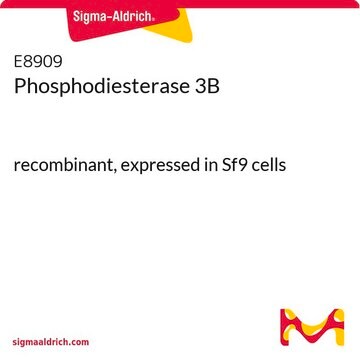E9034
Phosphodiesterase 5A1 human
recombinant, expressed in Sf9 cells
Synonyme(s) :
3′,5′-cyclic-GMP phosphodiesterase, PDE 5A1
Se connecterpour consulter vos tarifs contractuels et ceux de votre entreprise/organisme
About This Item
Produits recommandés
Produit recombinant
expressed in Sf9 cells
Niveau de qualité
Forme
solution
Activité spécifique
≥2,000 unit/μg protein
Poids mol.
126 kDa
Numéro d'accès UniProt
Conditions d'expédition
dry ice
Température de stockage
−70°C
Informations sur le gène
human ... PDE5A(8654)
Description générale
Research area: Cell SignallingPDE5is located in various tissues such as the kidney, brain, lungs, cardiac myocytes,vascular smooth muscle cells, penile corpus cavernosum, platelets, andgastrointestinal tissues.
Actions biochimiques/physiologiques
PDE5 regulates vascular smooth muscle contraction and is involved in NO-cGMP signaling in platelets to control aggregation. PDE5 may also be involved in the regulation of cGMP signaling in the brain and may modulate pressure-induced cardiac hypertrophy and fibrosis . Phosphodiesterase (PDE)is an enzyme that is used to break phosphodiester bonds. Phosphodiesterase 5 (PDE5), amolecular target for the treatment of erectile dysfunction and pulmonaryhypertension. PDE5 is used to find novel PDE5 inhibitors. PDE5 specifically targets cyclicguanosine monophosphate (cGMP) generated by the activation of nitric oxide (NO). PDE5 regulates cGMP signalingin the cardiovascular and other tissues. At the genetic level PDE5 isexpressed as various isoforms and undergoes phosphorylation as a post-translationalmodification that results in its activation. PDE5 is degraded through theubiquitin pathway due to its nitrosylation.
Propriétés physiques
N-terminal GST-tagged 126 kDa full-length protein
Définition de l'unité
One unit will convert 1.0 picomole of 3′,5′-cGMP to 5′-GMP per minute at pH 7.4 at 37 °C.
Forme physique
Supplied as a solution in 20% glycerol containing 40 mM Tris-HCl, pH 8.0, 110 mM NaCl, 2.2 mM KCl, 0.04% TWEEN® 20 and 3 mM DTT
Informations légales
TWEEN is a registered trademark of Croda International PLC
Code de la classe de stockage
10 - Combustible liquids
Classe de danger pour l'eau (WGK)
WGK 3
Point d'éclair (°F)
Not applicable
Point d'éclair (°C)
Not applicable
Certificats d'analyse (COA)
Recherchez un Certificats d'analyse (COA) en saisissant le numéro de lot du produit. Les numéros de lot figurent sur l'étiquette du produit après les mots "Lot" ou "Batch".
Déjà en possession de ce produit ?
Retrouvez la documentation relative aux produits que vous avez récemment achetés dans la Bibliothèque de documents.
Wesam S Ahmed et al.
Biomedicine & pharmacotherapy = Biomedecine & pharmacotherapie, 134, 111128-111128 (2020-12-22)
Phosphodiesterase 5 (PDE5) is one of the most well-studied phosphodiesterases (PDEs) that specifically targets cGMP typically generated by nitric oxide (NO)-mediated activation of the soluble guanylyl cyclase. Given the crucial role of cGMP generated through the activation of this cellular
Andrew T Bender et al.
Pharmacological reviews, 58(3), 488-520 (2006-09-14)
Cyclic nucleotide phosphodiesterases (PDEs) are enzymes that regulate the cellular levels of the second messengers, cAMP and cGMP, by controlling their rates of degradation. There are 11 different PDE families, with each family typically having several different isoforms and splice
Felicia Akuamoa et al.
Toxicology in vitro : an international journal published in association with BIBRA, 73, 105130-105130 (2021-03-05)
Herbal supplements sold as 'all natural' on various markets in Accra (Ghana) and advertised as highly efficacious in treating erectile dysfunction (ED) were bought and analysed by a PDE-5 enzyme inhibition assay. The claimed efficacy of these products could be
Notre équipe de scientifiques dispose d'une expérience dans tous les secteurs de la recherche, notamment en sciences de la vie, science des matériaux, synthèse chimique, chromatographie, analyse et dans de nombreux autres domaines..
Contacter notre Service technique








